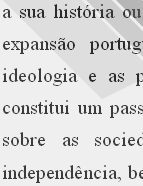

................................
As expected, Ralph Delgado proposed a Lusocentric historical periodisation, beginning in 1472, with the "discovery", then developing around the slave trade, "the Luso-Flemish conquest and condominium", the economic relations with Brazil, characterised between 1836 and 1918 by the "abolition of slavery, the definitive occupation of the territory and the commencement of the exploitation of wealth sources"; the last period (open-ended) "from 1918 to ? " was concerned with the study of "economic and administrative expansion, social transformation and the path towards the creation of a large-scale Portuguese state" (p. II). The vision of the white history of a white Angola relegated the Africans to a historical non-space, confirmed by the prejudiced reading of the social, political, and religious dynamics of one of the most organised Angolan national structures before the appearance of the Portuguese: the Kongo kingdom, which he refers to as "a country of blacks without baptism, (...) with all the signs of a tribal organisation", evidencing an embedded "savagery" in the longue durée. On the other hand, the positive values were all embodied by the Portuguese "bearers of an urban civilisation and thrown abruptly into this primitive society [which] they wish to transform", imposing progress and civilising change (1948, II-III).
The second type of writing, which acknowledged a place for Africans in certain situations and contexts, was marked by the weight of Lusotropicalism. The Other had become indispensable for mestizaje, without which Portuguese colonial history could not have the same density. The História de Angola [History of Angola] (1929) by Alberto de Lemos, an official who held important posts in Luanda's administrative hierarchy and who organised the Arquivo Histórico de Luanda [Historical Archive of Luanda] (1937), embodied a Lusocentric vision, the Lusotropicalist version, revealing an articulation between the legitimate historical foundations of the "colonial cause which is still today its [Portugal's] main justification" and the duty to "populate and civilise its extremely extensive possessions, collaborating in the progress of humanity in general", whereby colonisation became "the fundamental function of our nationality" (Lemos, 1929, 61).
Organised around characteristic events of Portuguese life in Angola, and using analogy to remain completely loyal to Portuguese history (the Battle of Ambuíla is the 'Aljubarrota of Angola'), Lemos engaged mestizaje, a practice in his own family life, to record an indisputable historical certainty: the preponderant role of great urban mestizo families in the formation and consolidation of a Portuguese Angola (Lemos, Nótulas Históricas [Historical Notes], 1969, 240).
